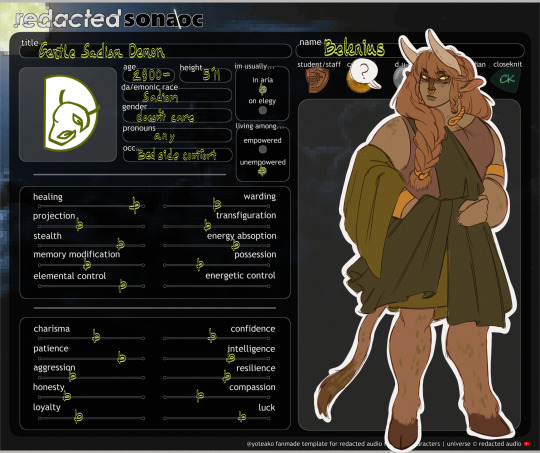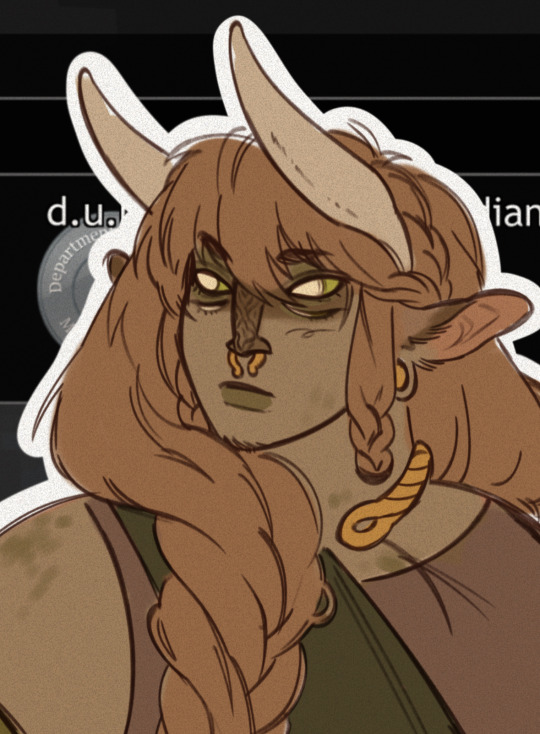#belenus is the Gaelic god it’s inspired by the sun and healing god
Note
how much do i have to pay for you to make your own redactedsona (foaming at the mouth)
👁️👁️uh—

Nothing it is done
:3
They hang around hospitals and suck up all the suffering before someone dies, responsible for a lot of that euphoria before death for a lot of people ^^

#they refuse to change how they look to fit in#majority of the time they’re invisible as a force anyways so#eh#coalesced and has been chillin#belenus is the Gaelic god it’s inspired by the sun and healing god#redacted asmr#freggzocs#freggzartz#redacted audio
27 notes
·
View notes
Text
Names for Witches
An updated version of an earlier list! Good and evil witches alike:
Acrasia: A witch in The Faerie Queene who tempts and bewitches people, controlling their minds. Means "lacking command."
Agatha: Means "good." A disproportionately common name for witches in media, including the Enchantress from Beauty and the Beast, Aggie Prenderghast from ParaNorman, and Aggie Cromwell from Halloweentown.
Aglaonice: A Thessalian witch from the writings of Plutarch, who could draw the moon down from the sky (probably referring to an eclipse). She might just have been an astronomer!
Akantha: A Greek name meaning "thorn."
Akitophis: The name of an unkown goddess mentioned in the PGM. Possibly a name or epithet of Ereshkigal.
Alcina: An evil sorceress and seductress from Orlando furioso, and the title character of a series of operas. Meaning uncertain.
Alcmene: The mother of Heracles. Means “moon strength.”
Aradia: The title character of Charles Geoffrey Leland's book Aradia, or the Gospel of the Witches. A moon goddess and basically the witch version of Jesus, at least in that book.
Arcana: Latin word meaning “secret” (literally “to shut in a chest”), also a word for the two groups of cards in a tarot deck.
Argante: The Queen of Avalon in one Arthurian text, a version of Morgan le Fay. Might be related to argenta (“silver”).
Arianrhod: A Welsh goddess, associated with the moon, stars, fertility, and the passage of time. Means “silver wheel.”
Armida: The name of the witch/seductress in Tasso’s Jerusalem Delivered, meaning uncertain.
Asteria: A Titaness and the mother of Hecate, the goddess of falling stars, prophecy, astrology, and oneiromancy. Means “starry.”
Asterope: The mother of Circe in one telling. Means either “lightning” or “star-faced.” (Also the name of one of the Pleiades.)
Autumn: The season containing Halloween/Samhain.
Belladonna: Deadly nightshade, a poisonous herb. Means "beautiful woman."
Briar: Refers to thorny bushes. Could be associated with evil enchantments, beautiful roses, or both.
Brigid: Celtic fire goddess. Means either "strength, virtue" or "exalted one."
Cassandra: A Greek prophetess whom Apollo cursed so no one would believe her. Means "she who entangles men." Could be shortened to "Cassie."
Cerridwen: Welsh enchantress goddess associated with the sacred cauldron of divine inspiration. Means "white poet."
Circe: A sorceress in Greek mythology who turned men into animals and who was a priestess of Hecate. Means "hoop-round."
Despoina: A daughter of Demeter and Poseidon associated with the Eleusinian Mysteries. Means “the mistress.” Also an epithet of Hecate and Persephone.
Diana: Roman name of the goddess Artemis, the virgin goddess of the moon and the hunt. Associated with Dianic Wicca, a modern cult centered around this goddess.
Edana: Celtic, means “little fire.”
Elergia/Annowre: An evil sorceress in Arthurian legend who tries to seduce Arthur.
Endora: The Witch of Endor was a sorceress in the Bible.
Empusa: Female monsters that served Hecate. Means “one-legged.”
Erichtho: A horrifying, evil hag from Lucan’s Pharsalia. Meaning uncertain.
Esmeralda: The name of Granny Weatherwax (from Discworld), means "emerald."
Freya: Norse goddess of love, beauty, sex, and war, means "lady."
Ganeida: An Arthurian sorceress, a sister of Merlin.
Grimhilde: The name given to the Evil Queen in Disney's Snow White. Good for fairy-tale-esque witches, could also work for a kinda Gothy heroic character. Means “masked battle.”
Gwendolyn: A Welsh name meaning "white bow" or "white ring."
Habundia/Habonde: "Abundance," a name for the queen of witches or fairies, associated with Diana, Mab, Nicnevin, and Hecate.
Hazel: Witch-hazel is a shrub with yellow flowers, associated with witches because of its name and its medicinal properties. Actual hazel is an all-purpose wood for magic wands.
Hecate: The goddess of witchcraft, necromancy, the night, and the crossroads in Greek mythology. Means "worker from afar.”
Hecuba: The Queen of Troy, mother of Cassandra. Uncertain etymology, possibly related to "Hecate." She turned into a dog and became one of Hecate’s familiars.
Hellawes: An evil sorceress in Arthurian legend, who seeks to kill Lancelot so she can embalm his corpse and kiss it every day to spite Guinevere. Creepy.
Hellebore: A poisonous herb.
Ianira: A name of several nymphs in Greek mythology, possibly meaning "enchantress."
Ingrid: A Norse name combining the name of a fertility god and the word for "beautiful."
Ivy: A plant thought to drive out evil spirits.
Lamia: A vampire-like monster from Greek mythology that eats children. Name of the witch in the film version of Stardust.
Lilith: The Queen of Demons in Hebrew folklore, means "of the night,” referring to a screech owl.
Lilura: Basque name meaning "enchantment."
Louhi: An evil witch queen in Finnish mythology. Means "trance."
Luna: Roman goddess of the moon.
Maeve: Based on Irish Gaelic, means "intoxicating." Possibly related to Queen Mab.
Medea: Means "cunning," a sorceress in Greek mythology who helped Jason steal the Golden Fleece. Took violent revenge when he left her for another woman.
Melissa: An apprentice of Merlin, who rescues the victims of Alcina. Means “honeybee.”
Morana/Marzanna: The Slavic goddess of death and winter, means "death."
Morgana: Name of the famous sorceress Morgan le Fay from Arthurian legend. Means “sea circle.”
Morrigan: Irish goddess of death, war, and ravens, means “great queen” or “phantom queen.”
Morwenna: A Welsh name meaning “maiden,” the name of the witch in the book version of Stardust.
Nepenthe: A magical drug from the Odyssey that cures sorrow and causes forgetfulness.
Nicnevan: Queen of the Fairies in Scottish folklore, and the witch queen of Samhain. Means "daughter of the divine." Identified with Hecate.
Nimue: A name for the Lady of the Lake, and/or the sorceress who encased Merlin in a tree with his own magic. Might be related to a Greek word meaning "memory."
Nyx: The Greek primordial goddess of and personification of the night.
Orenda: Iriquois name meaning "magical power."
Persephone: Greek goddess of flowers and Queen of the Underworld. Means either "wheat-thresher" or alternatively "destroyer."
Ragana: Lithuanian Crone goddess of witchcraft.
Raven: The bird, associated with death, magic, and prophecy in multiple mythologies.
Sage: Unisex, a cleansing herb used in many magic spells. From Latin, “healing plant.”
Selene: The Greek goddess and personification of the moon.
Sibyl: Greek, “prophetess,” a word for an oracle.
Strega/Striga: "Strega" is the Italian word for witch (and a word for Italian neopaganism). "Striga" is the Latin word for witch and means "screech owl" (owls are in the order "strigiforms") and a genus of flower called "witchweed."
Sycorax: The name of the witch in Shakespeare’s The Tempest, who is probably based on Medea. Uncertain etymology.
Taika: Finnish, "magic spell."
Vervain: An herb with magical and medicinal properties.
Venefica: A Latin word that simply means “woman who poisons,” referring to a woman who works magic by means of potion-making.
Vivian: A name for the Lady of the Lake, means "lively."
Willow: A tree associated with witches and spirits
And, because I don’t want to neglect the men, here’s a few for male witches (I haven’t been able to find nearly as many!):
Abdecian: Means “to get by asking,” as in a magic spell. (Disclaimer: I have no idea where I got this name. I had it written in my notes, and I remember finding it somewhere, but when I searched it I got mainly my own content on various websites. So… idk.)
Abraxas: A magic word found throughout Greek magic spells as a name of power. The name of the “Great Archon” in Gnosticism, also the name of one of the horses of the Sun. Etymology uncertain. Also spelled Abrasax.
Alaric: Germanic, “all-powerful.”
Alistair: Scottish variant on Alexander, meaning “defender of mankind.” Similar to the chosen name of a certain famous occultist.
Altair: The brightest star in Aquila. Means “eagle.”
Amergin: A druid in Irish mythology, “born of song.”
Aspen: A white tree, associated with fairies. Its leaves turn golden in the fall, and they appear to “shimmer” in the breeze.
Arawn: The Welsh lord of the Otherworld and the dead, and leader of the Wild Hunt. Etymology uncertain; might be a variant of the Hebrew Aaron, “exaulted.”
Aurelius: Latin, “golden.”
Belenus: Pan-Celtic god of light and healing identified with Apollo, who gave his name to Beltane. Means “shining one.”
Briar: Refers to thorny bushes. Same fairy-tale associations.
Eliphas: Hebrew, “God is agile.” The pen name of the famous occultist Alphonse Constant.
Gwydion: Means “born of trees,” a magician and trickster god in Welsh mythology.
Hemlock: A poisonous herb used in spells.
Hunter: Self-explanatory. Modern witchcraft tends to involve the worship of forest gods associated with hunting.
Mabon: Welsh, “divine son,” a figure in Arthurian legend. His name was given to the autumn equinox in modern paganism.
Maddock: Welsh, “fortunate.”
Melchior: One of the Biblical magi, “king of light.”
Merle: A unisex name, from Latin, meaning “blackbird.”
Raven: The bird, associated with death, magic, and prophecy in multiple mythologies.
Rowan: Irish, “little red one,” the name of a tree with the ability to ward off evil.
Simon: Greek, from Hebrew, “hearkening.” The name of an ancient sorcerer, Simon Magus, who founded Gnosticism in early Christianity.
Soma: A name with various mystical meanings in different languages. In Greek, it means “body.” In Sanskrit it means “distill, extract” and refers to the drink of the gods, as well as being another name for the Hindu moon god, Chandra. In Finnish, it means “pretty.”
Tanwyn: Welsh, “white fire.”
Taliesin: A legendary bard in Welsh folklore, the son of Cerridwen. Means “shining brow.”
Valerian: A medicinal herb, used to induce sleep. “Health, vitality.”
748 notes
·
View notes